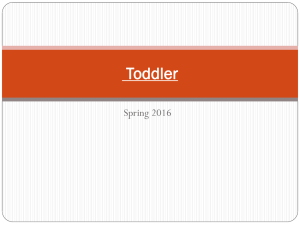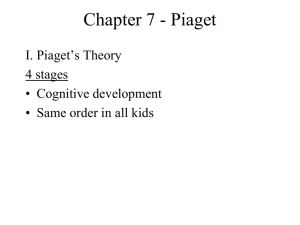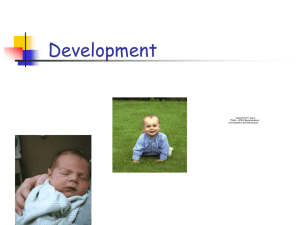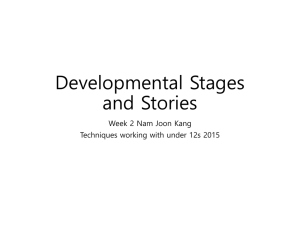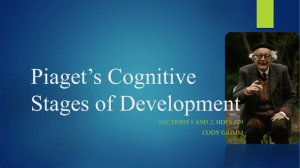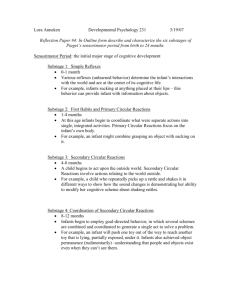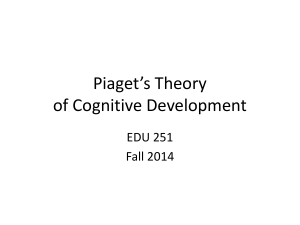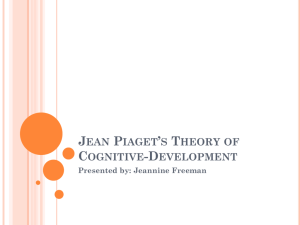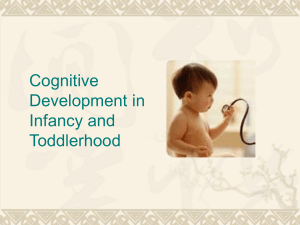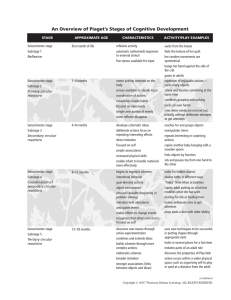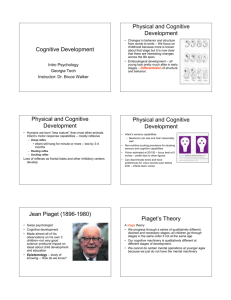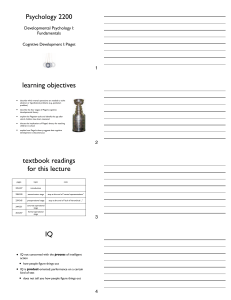Piaget's Stages Key Piagetian Concepts Sensorimotor
advertisement
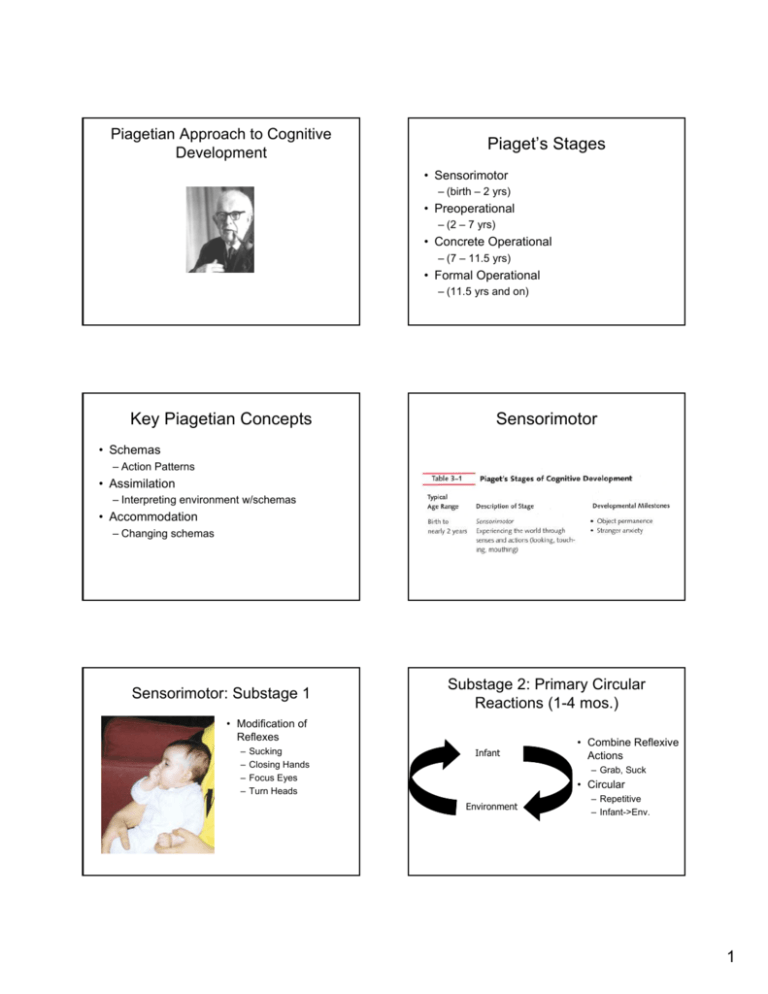
Piagetian Approach to Cognitive Development Piaget’s Stages • Sensorimotor – (birth – 2 yrs) • Preoperational – (2 – 7 yrs) • Concrete Operational – (7 – 11.5 yrs) • Formal Operational – (11.5 yrs and on) Key Piagetian Concepts Sensorimotor • Schemas – Action Patterns • Assimilation – Interpreting environment w/schemas • Accommodation – Changing schemas Sensorimotor: Substage 1 Substage 2: Primary Circular Reactions (1-4 mos.) • Modification of Reflexes – – – – Sucking Closing Hands Focus Eyes Turn Heads Infant • Combine Reflexive Actions – Grab, Suck • Circular Environment – Repetitive – Infant->Env. 1 Substage 3: Secondary Circular Reactions (4-8 mos.) Substage 4: Coordination of secondary reactions (8-12 mos) • Increasing interest in outcomes beyond child’s body • Knock barrier out of way to grasp matchbox • Object Permanence • Understand particular actions produce particular effects – Ball rolling away • Increasing Efficiency Organizing Circular Reactions – Kicking response to swinging mobile Lack of Object Permanence Substage 5: Tertiary Circular Reactions (12-18 mos.) • Active exploration of what objects can do • Deliberate “scientific” variation of actions in order to observe effects Substage 6: 18-24 mos. • Beginning of Representational Thought • Delayed Imitation The Child’s Expanding World • Primary – Perform Action – Note Effect on Own Body • Secondary – Perform Action – Note Effect on Body or External World – Note Cause/Effect Relation • Tertiary – Form Goal/Perform Act – Vary Actions/Targets – Causal Relationships 2 Infancy Preoperational • Activities – Body-centered Æ World-centered • Goals – Concrete Æ Abstract • Increasing correspondence between intention and behavior Egocentrism My dad is a fireman. … He’s a hero! I’m 6 years old! … My birthday is today. Neo-Piagetians Mountain Task • What can the doll see? • Mountain w/trees, Mountain w/cross, Snowy Mountain Concrete Operational • Mountain Task too Complicated! – Success on Simple Perspective Tasks • Development Gradually Unfolds 3 Conservation of Number • Are there the same number of objects in each row? Conservation of Liquid Conservation of Mass • Is there the same amount of clay in each ball? • Is there still the same amount of clay? Conservation of Liquid • Bruner – Child succeeds when tall beaker is covered • Physical Appearance Overwhelming • Which glass has more water in it? Transitivity • 8-9 years of age • Important for Seriation – Child does understand conservation Seriation • Ability to put things in an ordered series • 4-year-olds baffled! • 5-year-olds use pairwise comparisons • 7-year-olds have adult competence 4 Limitations of Concrete Ops Formal Operational • Some abstract reasoning still beyond concrete operational child – Counterfactual Reasoning – Abstract Scientific Concepts Isolation of Variables • What causes the pendulum to change speed? • Young: try 1 weight w/1 string, another weight w/another string • Older: start w/shortest string & try different weights on it Chemical Problem Combinatorial Reasoning • Fulcrum Problem: balance the seesaw • Combinatorial – weight and distance from fulcrum must both be taken into account Cognitive Development • Piaget: 0 Æ Logic in 4 stages • Age 6: Big birthday • Major Factors • Pour g into A: turns yellow; g into B clear • Find a combination of chemicals that does this • Requires systematic testing to realize you need to combine chemicals (and to figure out which ones!) • Very culture-specific task – <2 brain maturation – >2 knowledge – Processing Resources (attention, WM) 5 Criticisms of Piaget • Empirical Details – Piaget consistently underestimates age at which children able to do certain things – Perhaps his children were somewhat slow in developing? • Stages versus gradually development – Objections to discrete series of stages versus idea of development as more of a gradual process • Ethnocentric – Some have noted that Piaget’s theory is how to become a Swiss scientists – Much of the changes outlined in childhood reflects the western educational system rather than inevitable changes related to maturation 6
